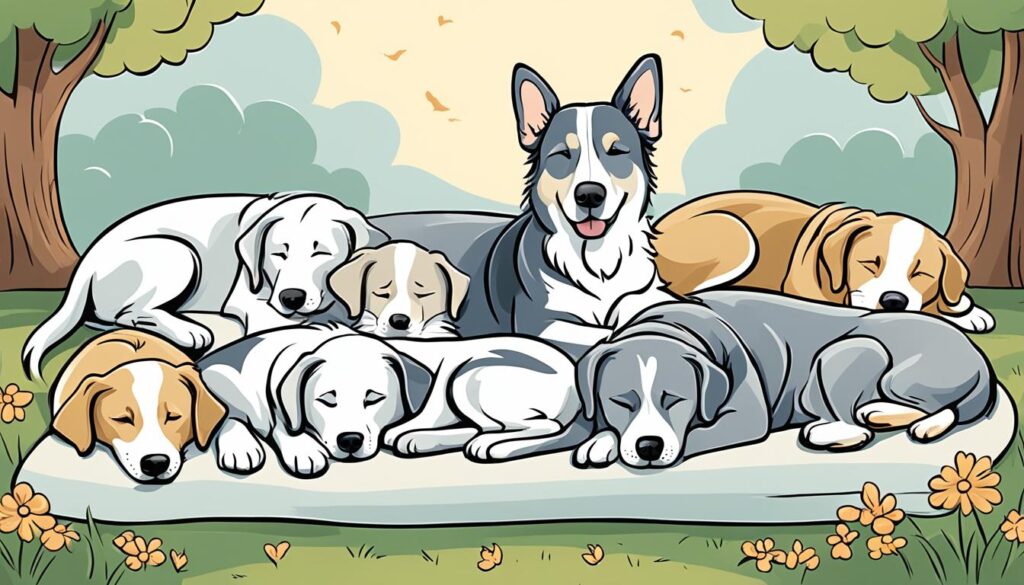Senior Dog Serenity: Aging Gracefully

Did you know that there are over 46 million senior dogs in the United States alone? These loyal companions have spent years by our sides, bringing us joy and love. As they enter their golden years, it’s vital that we provide them with the care and attention they deserve. In this section, we will explore the advantages of adopting a senior dog, the importance of exercise and grooming, and what exactly defines the senior stage for our beloved furry friends.
Key Takeaways:
- Senior dogs make wonderful companions and have a lot of love to give.
- Older dogs are usually housetrained and have established temperaments.
- Understanding the changes that come with the senior stage is crucial for their well-being.
- Health considerations such as arthritis and dental issues need to be addressed.
- Fostering or adopting a senior dog provides stability and a loving home.
Advantages of Senior Dog Adoption
When considering bringing a new furry friend into your life, adopting an older dog can be a wonderful choice. Older dogs come with their own set of advantages that make them a great addition to any family. In this section, we will explore the benefits of senior dog adoption and the value they bring to our lives.
Housetrained and Obedient:
One of the significant advantages of adopting an older dog is that they are usually housetrained. Unlike puppies, who require extensive training and patience, older dogs already have an established routine and are familiar with basic obedience commands. This makes the transition into your home much smoother and saves you from the potential challenges of housebreaking.
Well-Established Temperament:
Another advantage of adopting an older dog is having a well-established temperament. Unlike puppies whose personalities are still developing, senior dogs have a predictable and stable demeanor. Their temperament is already formed, allowing you to choose a companion that matches your lifestyle and preferences. Whether you’re looking for an energetic playmate or a calm cuddle buddy, there’s a senior dog out there ready to fit right into your family.
Experience and Maturity:
Senior dogs bring with them a wealth of experience and maturity. They have seen and learned so much throughout their lives, making them wise and adaptable companions. Their experience often means they are more tolerant, patient, and well-behaved in various situations. Their calm, steady nature can be a soothing presence in your home and provides a heartwarming sense of stability.
“Adopting a senior dog means welcoming a furry friend who comes with a set of valuable skills and knowledge acquired over years of life experience.”
Continuing Activities:
Adopting an older dog doesn’t mean giving up on the activities you’ve always enjoyed together. In fact, it’s crucial to continue engaging in activities like exercise and grooming to maintain their physical and mental well-being. Regular exercise helps keep senior dogs in good shape, improves their joint health, and prevents obesity. Grooming not only keeps them clean and healthy but also strengthens the bond between you and your aging companion.
Adopting an older dog is a fulfilling experience that brings immense joy and companionship. Their housetrained nature, well-established temperament, and wealth of experience make them excellent candidates for adoption. By continuing your shared activities, you provide them with the love and care they deserve. So consider welcoming a senior dog into your life and discover the unique joys of older dog adoption.
| Advantages of Senior Dog Adoption |
|---|
| Housetrained and Obedient |
| Well-Established Temperament |
| Experience and Maturity |
| Continuing Activities |
Understanding the Senior Stage
The senior stage for dogs is an important phase in their lives that is characterized by noticeable changes in their physical abilities, energy levels, and overall health. It’s crucial for dog owners to understand these changes and provide appropriate care for their senior companions. This section will provide insights into the senior stage for dogs, focusing on common issues such as sleep patterns and weight management.
Sleep Patterns
During the senior stage, dogs tend to sleep more compared to their younger counterparts. This increase in sleep can be attributed to various factors, including age-related changes in metabolism and declining energy levels. It’s essential to ensure that senior dogs have a comfortable and quiet sleeping environment to support their restful slumber.
Weight Management
Weight management becomes increasingly important as dogs enter the senior stage. Due to reduced activity levels and changes in metabolism, senior dogs are more prone to weight gain. Maintaining a healthy weight is crucial to avoid additional strain on joints and promote overall well-being. Consult with your veterinarian to determine the appropriate diet and exercise plan for your senior dog’s weight management needs.
To further illustrate the significance of weight management, here is a comparative table that highlights the impact of weight gain on senior dogs:
| Weight Gain | Consequences for Senior Dogs |
|---|---|
| Obesity | – Increased risk of joint problems |
| – Elevated risk of heart disease | |
| – Higher likelihood of diabetes |
By actively managing your senior dog’s weight, you can help reduce the risk of these potential health issues and ensure a higher quality of life.

Sleep is essential for the well-being of senior dogs. Just like humans, they require adequate rest to maintain their physical and mental health. Understanding their sleep patterns can help you provide a comfortable environment for their golden years.
Health Considerations for Senior Dogs
As dogs age, they become more susceptible to certain health issues that require special attention and care. Arthritis, dental problems, and diminished senses are common concerns for senior dogs. Understanding these conditions and implementing preventive measures can significantly enhance your senior dog’s overall well-being and quality of life.
Arthritis
Arthritis is a degenerative joint disease that causes pain, stiffness, and discomfort in senior dogs. It can greatly affect their mobility and daily activities. Regular exercise, joint supplements, and a balanced diet rich in Omega-3 fatty acids can help alleviate symptoms and slow down the progression of arthritis.
Dental Issues
Dental problems are prevalent among senior dogs due to tartar buildup, gum disease, and tooth decay. These issues can lead to pain, difficulty eating, and even systemic health problems if left untreated. Providing regular dental care, including brushing your dog’s teeth, offering dental treats, and scheduling professional dental cleanings, is crucial for maintaining your senior dog’s oral health.
Diminished Senses
As dogs age, their senses, such as hearing and vision, may become diminished. They may have difficulty hearing commands or recognizing familiar faces and objects. It’s important to create a safe environment for your senior dog, minimizing potential hazards and offering clear verbal cues during training sessions. Regular check-ups with the veterinarian can help identify and manage any age-related sensory issues.
Regular veterinary check-ups are vital to monitor your senior dog’s overall health. The veterinarian can perform thorough examinations, assess specific health conditions, and provide appropriate treatments or therapies. Additionally, ensuring a well-balanced diet tailored to your senior dog’s nutritional needs is essential for maintaining their overall health and managing any specific health concerns they may have.
Remember, early detection and intervention are key to managing and alleviating health issues in senior dogs. By being proactive and implementing the necessary preventive measures, you can ensure that your beloved senior dog enjoys a happy and comfortable life in their golden years.
Fostering and Adopting Senior Dogs
Fostering or adopting a senior dog can be a truly rewarding experience that often goes overlooked. These older dogs offer stability, predictability, and a unique kind of companionship that can bring an immense sense of joy to your life. Despite this, senior dogs are often overlooked in shelters, and yet they have so much love to give.
When you open your home to a senior dog, you provide them with the stability and comfort they need in their golden years. Senior dogs have already settled into their temperaments, making it easier to predict their behavior and build a strong bond. They have a calmness about them that can bring a sense of peace to your home.
By fostering or adopting a senior dog, you also provide them with a second chance at experiencing the love and care they deserve. Many senior dogs have spent their lives dedicated to their previous owners, only to find themselves surrendered or abandoned later in life. Offering them a safe and loving home can make all the difference.
When you choose to foster or adopt a senior dog, you become part of their journey, providing them with the care and attention they need in their twilight years. You have the opportunity to create lasting memories together, cherishing every moment spent together.
“Fostering or adopting a senior dog allows you to provide love, stability, and a sense of belonging to a dog that may have been overlooked. It’s a truly rewarding experience that brings so much joy.”
So why not consider fostering or adopting a senior dog today? The love and companionship they offer are unmatched, and by providing a loving home, you make a significant difference in their lives. Together, you can create a lasting bond and write a beautiful final chapter of their story.
The Benefits of Fostering and Adopting Senior Dogs:
- Affectionate companionship from a well-established temperament
- Stability and predictability in their behavior
- Opportunity to provide a loving home to a dog in their golden years
- Sense of fulfillment from giving a senior dog a second chance
- Creating lasting memories with your furry friend
| Category | Benefits of Fostering and Adopting Senior Dogs |
|---|---|
| Aging Gracefully | Fostering or adopting a senior dog allows them to age with dignity and surrounded by love. |
| Loving Companionship | Senior dogs offer unwavering love and companionship, providing valuable emotional support. |
| Stability and Predictability | Senior dogs have established temperaments, making it easier to predict their behavior and integrate them into your home. |
| A Second Chance | By fostering or adopting a senior dog, you offer them a fresh start and a chance to experience love and care once again. |

By fostering or adopting a senior dog, you become their guiding light, providing them with stability, predictability, and above all, the love they deserve. Make a difference in a senior dog’s life and experience the joy of giving them a loving home.
Conclusion
Caring for a senior dog is a special responsibility that requires understanding, love, and patience. These aging companions bring joy and companionship to our lives, and it’s our duty to ensure their golden years are filled with comfort and happiness.
By following the guidelines of senior dog care, such as providing proper nutrition, regular exercise, and regular veterinary check-ups, we can help our senior dogs maintain their health and well-being. Additionally, considering the benefits of adoption and fostering can provide these aging companions with a second chance at a loving home.
Senior dogs have given us their unconditional love throughout their lives, and now it’s our turn to return the favor. Let’s cherish their golden years, provide them with the care they deserve, and make their senior stage a time of grace and serenity. Together, we can ensure that our aging dogs find comfort, happiness, and love in their final years.
FAQ
What are the advantages of adopting an older dog?
Adopting an older dog has several advantages. Older dogs are usually housetrained, have basic obedience skills, and have well-established temperaments. They can be a great addition to your family, providing love and companionship.
How do I understand the senior stage for dogs?
The senior stage for dogs is defined by noticeable changes in their physical abilities, energy levels, and overall health. Dogs may sleep more, eat less, be more susceptible to weight gain, and develop dental problems during this stage. It’s important to understand these changes and provide appropriate care for your senior dog.
What health considerations should I keep in mind for my senior dog?
Senior dogs are more prone to certain health issues such as arthritis, dental problems, and diminished senses. Regular veterinary check-ups, proper nutrition, and understanding the signs of various health conditions are essential for maintaining your senior dog’s wellbeing.
What are the benefits of fostering and adopting senior dogs?
Fostering or adopting a senior dog is a rewarding experience that often goes overlooked. Senior dogs offer stability, predictability, and a unique kind of companionship. They are often overlooked in shelters, yet they have so much love to give.
How should I care for my senior dog?
Caring for a senior dog is a special responsibility that requires understanding, love, and patience. By following the guidelines of senior dog care and considering the benefits of adoption and fostering, we can provide our aging companions with a life full of grace and serenity.